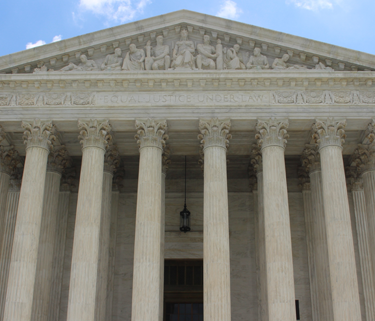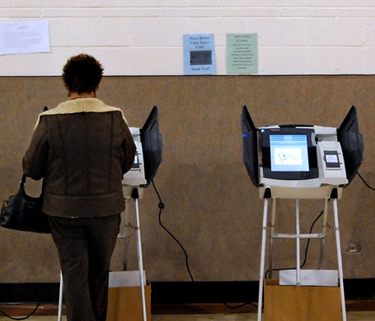On February 25, President Biden nominated Judge Ketanji Brown Jackson for Associate Justice of the United States Supreme Court to fill the upcoming vacancy due to the retirement of Justice Stephen Breyer. This is the first-ever nomination of a Black woman to the Supreme Court as well as the first-ever former public defender. Judge Jackson currently sits as a circuit judge on the United States Court of Appeals for the District of Columbia Circuit and has previously served as a clerk for Supreme Court Justice Stephen Breyer, a public defender, a Commissioner on the U.S. Sentencing Commission, and as a judge for the U.S. District Court for the District of Columbia. Judge Jackson has received Columbia Law School’s Empowering Women of Color Constance Baker Motley Award. Judge Jackson’s confirmation hearing before the Senate Judiciary Committee begins on March 21.
Each nomination to the Supreme Court is incredibly significant. The Arc reviews the record of Supreme Court nominees to determine whether prospective members of the Court demonstrate a strong commitment to advancing disability civil rights and ensuring equal application of the law. The purpose of The Arc’s review is to educate the public about a given nominee’s record in order to contribute to greater understanding of the nominee with regards to the issues of greatest relevance to people with intellectual and developmental disabilities (IDD) and their families and supporters.
Judge Jackson has authored nearly 600 opinions since being appointed a judge in 2011. Here, we highlight some areas of her jurisprudence particularly relevant to people with disabilities.
EDUCATION
The Arc’s position statement on Education states: “All children with IDD must receive a free appropriate public education that includes fair evaluation, ambitious goals, challenging objectives, the right to progress, individualized supports and services, high quality instruction, and access to the general education curriculum in age-appropriate inclusive settings.”
In her opinions related to the education of students with disabilities, Judge Jackson has generally demonstrated an appreciation for the obligations of school districts to provide the supports students with disabilities—including those with the most significant disabilities—need to thrive. For example, Judge Jackson has held that public schools must ensure a private placement for a student with a disability can “adequately address” the student’s needs and provide the level of supports required for the student to receive a free appropriate public education (required by the Individuals with Disabilities Education Act) before making the placement.1 Judge Jackson has also rejected a school district’s argument that serving a student with intellectual disability and significant disability-related behaviors was “impossible” or that the student’s behavior excused the district from placing him in a program that could meet his needs and held that the school district violated the IDEA by failing to provide plaintiff an education following his expulsion.2
CRIMINAL JUSTICE
The Arc’s position statement on Criminal Justice states: “People with IDD have the right to justice and fair treatment in all areas of the criminal justice system, and must be afforded the supports and accommodations required to make justice and fair treatment a reality.”
Judge Jackson has generally shown a respect for the dignity of incarcerated people and upheld their rights to receive accommodations and fair treatment while entangled in the criminal justice system. For example, Judge Jackson has held that a jail violated the rights of a deaf inmate under federal disability rights laws when jail officials did nothing to assess the inmate’s need for reasonable modifications despite their knowledge of his disability and failed to provide him with a sign language interpreter, forcing him to communicate only through lip reading and written notes and sending him to solitary confinement.3 In her opinion, Judge Jackson wrote that although “[i]ncarceration inherently involves the relinquishment of many privileges,” incarcerated people retain important rights, “including protections against disability discrimination.”
Judge Jackson has granted a number of compassionate releases during the pandemic, including of prisoners with mental and physical disabilities.4 Judge Jackson has spoken out about the need for a robust public defense system in order to “protect the rights of the accused.”5 Judge Jackson has also expressed concern about the ability of people facing the death penalty to receive adequate opportunity to assert their innocence if new evidence emerges post-conviction.6 Such post-conviction evidence can also be critical in cases involving the death penalty and intellectual disability. The U.S. Supreme Court has held that the Eighth Amendment of the U.S. Constitution prohibits the execution of people with intellectual disability as cruel and unusual punishment and has mandated that states cannot ignore clinical science or impose procedures that create an “unacceptable level of risk” that people with intellectual disability will be executed.7 But proving that an individual has intellectual disability in the death penalty context involves a fact-intensive, comprehensive review of records since childhood as well as expert testimony and all too many individuals who likely have intellectual disability are initially represented by counsel unfamiliar with this area of law and are precluded from presenting relevant evidence to the court later on in the process because of procedural hurdles, resulting in miscarriages of justice for these defendants.
Prior to becoming a judge, Judge Jackson represented criminal defendants with mental health disabilities, including those with co-occurring intellectual or developmental disabilities and, thus, has a keen awareness of the barriers such individuals can face in accessing justice.8
EMPLOYMENT
The Arc’s position statement on Employment states: “People with IDD can be employed in the community alongside people without disabilities and earn competitive wages. They should be supported to make informed choices about their work and careers and have the resources to seek, obtain, and be successful in community employment.”
Judge Jackson has generally demonstrated an appreciation for plaintiffs’ allegations in employment discrimination actions and has held that federal disability rights laws require employers to engage in a meaningful, interactive process with employees with disabilities to ensure the employees have the reasonable accommodations they need to perform their jobs.9 For example, Judge Jackson has held that employers must consider job reassignments for qualified employees with disabilities as reasonable accommodations where other accommodations have proved ineffective. Judge Jackson has also repeatedly emphasized the importance of allowing discovery to proceed to ensure that plaintiffs challenging workplace discrimination have a fair opportunity to present their case.10 Judge Jackson has also demonstrated a commitment to ensuring that pro se plaintiffs—plaintiffs who represent themselves—are able to meaningfully assert their rights in court, ensuring access to justice for those without legal representation who may have misunderstood legal processes and procedures, including for disability-related reasons, among others.11
At times, Judge Jackson has imposed a relatively high bar for proving employment discrimination and has, at times, read procedural requirements in restrictive ways that limit the avenues for relief for employees alleging discrimination.12
CIVIL RIGHTS
The Arc’s position statement on Human and Civil Rights states: “The human and civil rights of all people with IDD must be honored, protected, communicated, enforced and thus be central to all advocacy on their behalf.”
Judge Jackson has generally demonstrated an understanding of the robust protections provided by federal and disability civil rights laws. For example, in a case alleging that Uber discriminated against wheelchair users, Judge Jackson held that people with disabilities do not need to engage in the “futile gesture” of making themselves subject to Uber’s discriminatory policies in order to have standing to sue the company.13 This principle also applies in other contexts under federal disability rights laws and allows, for example, people with IDD who are at serious risk of institutionalization to challenge government policies that deny them community-based services and supports even if they have not yet been institutionalized. Judge Jackson also held that Uber is a public transportation company—not a technology company—and is subject to liability under the Americans with Disabilities Act, ensuring that the rights of people with disabilities are protected in a rapidly changing transportation industry.
Judge Jackson has also participated in a decision upholding President Biden’s eviction moratorium designed to keep renters in their homes during the COVID-19 pandemic, demonstrating a concern for the rights of the most vulnerable residents, which includes renters with disabilities who face a disproportionately severe risk of experiencing homelessness and complications from COVID-19.14
With over a decade on the federal bench, Judge Jackson has extensive relevant experience to serve as a Supreme Court justice. In her nearly 600 opinions on a wide variety of topics, Judge Jackson has demonstrated an understanding and appreciation of the robust protections provided by federal disability and civil rights laws. In disability and other civil rights cases, Judge Jackson has shown a willingness to hear claims from injured plaintiffs, a commitment to avoiding imposing unfair burdens on plaintiffs, and has acknowledged the hardships that drove plaintiffs to seek relief. Her unique background as a public defender prior to becoming a judge and her overall judicial record indicates that she is committed to a generally robust interpretation of disability and civil rights laws, fundamental fairness for all, and ensuring that plaintiffs receive their day in court. Judge Jackson’s historic nomination is important to The Arc as we are committed to access, equity, and inclusion in all we do, and our diverse and growing disability rights movement expects the institutions that uphold our democracy to reflect the full diversity of our country.
The Arc is grateful for a number of groups for publishing their research regarding Judge Jackson’s disability and civil rights record which this statement draws from. For a more thorough review of Judge Jackson’s record on a variety of topics, please see reports from the Bazelon Center for Mental Health Law, NAACP LDF, and the Alliance for Justice.
1 W.S. v. District of Columbia, 502 F. Supp. 3d 102 (D.D.C. 2020).
2 Schiff v. District of Columbia, Civil Action No. 18-cv-1382 (KBJ), 2019 U.S. Dist. LEXIS 189606 (D.D.C. Nov. 1, 2019).
3 Pierce v. District of Columbia, 128 F. Supp. 3d 250 (D.D.C. 2015)
4 See, e.g., United States v. Greene, No. 71-CR-1913 (KBJ), 516 F. Supp. 3d 1 (D.D.C. 2021); United States v. Dunlap, No. 17-CR-207 (KBJ), 485 F. Supp. 3d 129 (D.D.C. 2020); United States v. Johnson, No. 15-CR-125 (KBJ), 464 F. Supp. 3d 22 (D.D.C. 2020).
5 Ketanji Brown Jackson, “Responses to Questions for the Record from Senator Ben Sasse to Judge Ketanji Brown Jackson, Nominee to the United States Court of Appeals for the D.C. Circuit,” Senate Judiciary Committee (2022) at 465 (of PDF), available at https://www.judiciary.senate.gov/imo/media/doc/Jackson%20SJQ%20Attachments%20Final.pdf.
6 Ketanji Brown Jackson, “Supreme Court as Gatekeeper: Screening Petitions for ‘Original’ Writs of Habeas Corpus in the Wake of the A.E.D.P.A.” (November 2001), available at https://www.judiciary.senate.gov/imo/media/doc/Jackson%20SJQ%20Attachments%20Final.pdf (pp 1474-85).
7 See, e.g., Atkins v. Virginia, 536 U.S. 304 (2002), Hall v. Florida, 134 S. Ct. 1986 (2014), and Moore v. Texas, 137 S. Ct. 1039 (2017).
8 See, e.g., United States v. Kosh, 184 Fed. Appx. 4 (D.C. Cir. 2006); United States v. Lowe, 186 Fed. Appx. 1 (D.C. Cir. 2006).
9 See, e.g., Von Drasek v. Burwell, 121 F. Supp. 3d 143 (D.D.C. 2015); Mitchell v. Pompeo, No. 1:15-cv-1849 (KBJ), 2019 U.S. Dist. LEXIS 54797 (D.D.C. Mar. 31, 2019).
10 See, e.g., Tyson v. Brennan, 306 F. Supp. 3d 365 (D.D.C. 2017); Ross v. United States Capitol Police, 6 195 F. Supp. 3d 180 (D.D.C. 2016).
11 See, e.g., Horsey v. United States Dep’t of State, 170 F. Supp. 3d 256 (D.D.C. 2016).
12 See, e.g., Alford v. Providence Hosp., 60 F. Supp. 3d 118 (D.D.C. 2014); Crawford v. Johnson, 166 F. Supp. 3d 1 (D.D.C. 2016).
13 Equal Rights Ctr. v. Uber Techs., Inc., 525 F. Supp. 3d 62 (D.D.C. 2021).
14 Alabama Ass’n of Realtors v. United States Dep’t of Health & Hum. Servs., No. 1:20-CV-03377- DLF, 2021 WL 3721431 at *1 (D.C. Cir. Aug. 20, 2021).















